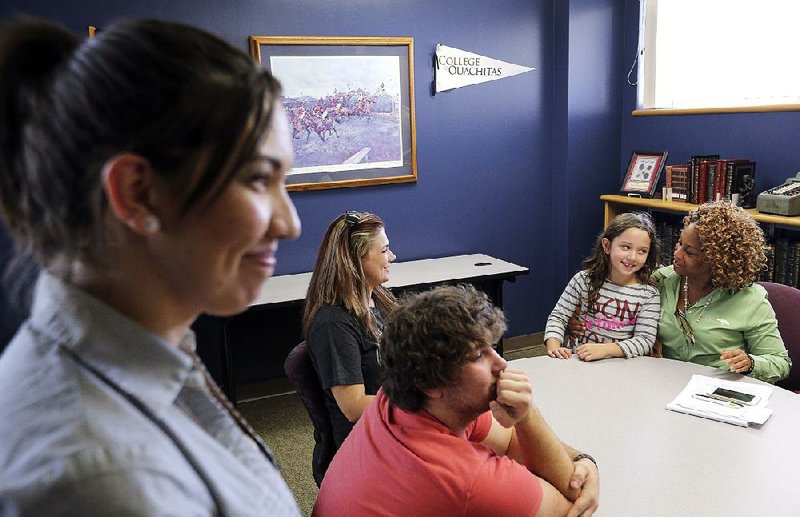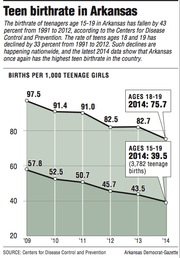At 18, Shannon Finley had her life on track.
She had taken college-level courses at Phillips Community College of the University of Arkansas in Stuttgart while in high school. She graduated from high school and started college there. She had dreams of writing for Rolling Stone.
And then she got pregnant.
Some seven years later, her daughter Athaliah Gerlach is starting second grade. And Finley, now 25, is again enrolled in college, this time at the College of the Ouachitas in Malvern.
She is beating the odds.
Nationwide, more than half of the teens who have unplanned pregnancies in college don't finish. Unplanned births account for one in 10 dropouts among female students at two-year colleges and 7 percent of all community college dropouts, according to a 2010 study by the American Association of Community Colleges.
Arkansas has the highest teenage birthrate in the nation, according to 2014 data: Of every 1,000 teens ages 15-19, there are 39.5 births, data show. The rate is higher for 18- and 19-year-olds: Out of every 1,000 teens in that age range, there are 75.7 births.
The teenage birthrate in the state and nationwide has dropped over the past 2½ decades, but the rate has fallen less steeply for 18- and 19-year-olds, data show.
The statistics and the stories are what prompted two state lawmakers to take on the issue last year. Reps. Deborah Ferguson, D-West Memphis, and Robin Lundstrum, R-Springdale, took to their peers a bill -- now Act 943 of 2015 -- that enlists colleges and universities in addressing unplanned pregnancies during advisory or orientation sessions starting this year.
The two lawmakers took a page out of Mississippi's playbook. In 2014, the neighboring state was the first in the nation to call on higher-education leaders to come up with a plan to curb unplanned pregnancies in older teens.
In Arkansas, the new law led to the formation of a 25-member work group, led by Angela Lasiter, a program specialist at the state Department of Higher Education. The group reviewed materials, such as online lessons and videos from the National Campaign to Prevent Teen and Unplanned Pregnancy, available to colleges and universities at no cost.
The group created its own video that features four Arkansans -- including Thorin Wright, 32, a father of four and a student at College of the Ouachitas -- who had unplanned pregnancies and describes how their lives changed as a result.
Wright had not planned for three of his four children. Now, the single father takes care of his two youngest daily, and attends college with the help of the Career Pathways program. The federally funded program helps low-income parents with social services and workforce skills.
His days start at 5:20 a.m. He gets his children to school and day care before going to the college about 8 a.m. He works there and takes classes throughout the day, then picks up his children in the evening. Bath time, supper, YouTube, bedtime at 9 p.m. He watches a lot of Dora the Explorer.
And he does it all over again the next day.
On weekends, he works at his father's company, and the kids tag along.
He and Finley said they don't have social lives.
As Finley's dad told her, "You remember how much you hated being grounded? Now, you're grounded for the next 18 years."
Many times, students at the Malvern school and at Arkansas Tech University in Russellville said their grade-school teachers either preached sexual abstinence or talked about sexually transmitted infections. They didn't get sex education in school, they said.
"When you don't get into very much detail, you just kind of brush it off," said Carlos Morales, 18, of Dardanelle, who is attending Arkansas Tech.
"Yeah, I'm pretty sure I brushed it off because it wasn't something that was a big thing," said Jahaziel Martinez, 18, of Russellville, also attending Arkansas Tech.
Morales, who is studying economics and finance, said: "People just laugh at it."
That leaves parents to address the subject -- or not.
"My dad was a single dad for a long time for three girls," Finley said. "Anything related to sex made him extremely uncomfortable."
Finley and Wright are part of a group that helped piece together the unplanned-pregnancy curriculum at the College of the Ouachitas. A total of 612 students applied for federal financial aid for the fall semester at the community college, officials said. Of those, 274 have children, and of those, 153 have enrolled in Career Pathways.
A recent College Count$ study found that Career Pathways students graduated at a higher rate than regular community college students. The program helps provide gasoline vouchers to students who are parents, as well as pays for child care.
Finley said she is applying for the program.
After giving birth, the Stuttgart native tried school again, enrolling in the for-profit Heritage College in Little Rock. She was working as many jobs as possible and had moved to Malvern after becoming a single parent. With just six weeks left to graduate as an X-ray technician, she dropped out.
"Becoming a single parent, I just couldn't afford to drive back and forth all day," she said.
And the student loans piled up. She eventually found part-time work at the college, which later hired her full time. In January, she enrolled there after being nudged by Kim Armstrong, the college's vice president of student affairs.
"I had big dreams," Finley said of her writing. "I don't get to do that, but that's OK. Whenever I graduate from here ... I will have double majored at strategic communications and political science. I'll have a bachelor's degree, and I can do a lot with one degree."
She added about her daughter: "I just want her to know what my dreams might have been -- she didn't ruin them. She made them better."
The college has always had some support for students who have children, Armstrong said, but this year, pregnancy prevention will also be part of it. Incoming freshmen got their first glimpse of the topic during orientation.
Freshmen will get in-depth lessons in a Student-Opportunity Seminar -- an hourlong, weekly course for freshmen -- which will include anatomical models of females and males. Also, two instructors will address the subject in a "special-topics" class, she said.
"So, we're making sure that we're not just doing it very quickly," Armstrong said. "We're taking the time to go through and really show the students the consequences of having an unplanned pregnancy and the long-term effects on your education -- but also on the economic needs of your child."
The University of Arkansas at Little Rock began addressing the problem of unplanned pregnancies some three years ago with family planning services, said Marie Sandusky, the university's director of health services and a family practitioner.
UALR also has hosted an interactive event that's held the day after students move in on campus. As part of the program, gift bags with rag dolls and necklaces are placed under 20 chairs in the room to show the prevalence of unplanned pregnancies, she said. The university also has a student group that meets in residence halls to discuss issues related to relationships.
And this year, on every desk in on-campus housing, students found a 4-by-6 card that read, "You plan for college. You plan to graduate. Why not plan for parenting?" The card also directs students to campus Health Services.
Orientation leaders and advisers, at that point, should have "planted the seed" of what Health Services provides, said Trakenya Dobbins, interim director of academic advising.
The university also has a standardized first-year experience course -- a mandatory, credit-bearing class for all students who have fewer than 12 credit hours -- that will include a unit on unplanned pregnancy. The course acclimates students to the campus and, this year, includes a scavenger hunt, with one stop at Health Services.
"If they missed that seed, they're getting it during the scavenger hunt," Dobbins said.
At Arkansas Tech in Russellville, orientation leaders mixed the new material in with safety measures about hazing and Title IX, a federal law that prohibits discrimination on the basis of gender in federally funded higher-education institutions. The federal law has been expanded to mandate that colleges and universities combat sexual harassment, including rape and assault.
Flashing across a Smart Board was: "Did you know that the state of Arkansas has the highest rates of birth in 18 to 19 year old females in the nation?"
To many of the Arkansas Tech freshmen, the statistic was a surprise.
"I figured it would have been bigger cities, like Miami or Las Vegas," said Makayla Clements, 18, of Winfield, La.
Clements was one of four freshmen -- out of 20 -- who said they had received sex education before their college orientation. In Louisiana, she said, high school teachers use half a semester to teach health and the other half sex education.
"There's some of the people who you could tell that they were just like, 'Oh, that's not going to happen to me,'" Clements, who is studying nursing, said of unplanned pregnancies. "And then there are some that were like, 'Oh, my God, if that happened, my parents would kill me.'"
For Sydney Blackwell, 18, of Alma, one of her first lessons on sex education and unplanned pregnancy was at a 4-H Club workshop on the topic.
"That was the first time I remember them saying Arkansas was high up there," she said. "I still heard about it, but it was just a shock to see that we were the No. 1 out of all 50 states. That's embarrassing."
In high school, the elementary education major said, her teachers explained sexually transmitted diseases, but nothing about unplanned pregnancy or birth control.
"You can't just say, 'Yeah, don't do it. It's bad,'" she said. "You have to explain the consequences, and I feel like after people know the consequences, then that might persuade them to wait until they're older or to wait until they could get proper contraceptives."
Blackwell said she is fortunate that she and her mother have a close relationship. They first talked about "the birds and the bees" in middle school, right before high school and once more before college, she said.
More needs to be done to combat unplanned pregnancy among older teens, Blackwell said.
"I remember in fifth grade, they gave us the 'period talk,'" she said. "So I don't understand why three, four years later, they can't give you the actual 'sex talk' because some parents won't talk about it with their kids. We just can't keep being traditional because then you're going to have more and more unplanned pregnancies."
Metro on 08/28/2016


